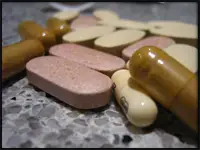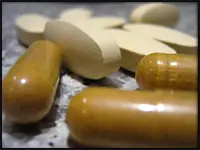Gout Medication
Gout Medication and NSAIDs.
For the majority of Gout sufferers NSAIDs are an extremely successful gout treatment and potential Gout cure.
NSAIDs are a non-steroidal anti-inflammatory drug which help in the reduction of inflammation and uric acid crystal buildup. NSAIDs ( pronounced En-sedz)
Gout medication such as Indomethacin (indocid),Ibuprofen and Napoxen are the most commonly prescribed NSAIDs.
Corticosteroids can also be used which are a very strong anti-inflammatory hormone which is taken orally or injected in the Gout affected joint and can be very painful in the process.
Prednisone is the most commonly prescribed.
Another Gout medication doctors will also prescribe is colchicine, but for a short period only if NSAIDs and corticosteroids fail to work. There are also side effects to colchicine such as nausea, vomiting, cramps,etc...
You must seek advice with Gout Medication especially on taking these drugs as they can be harmful to your stomach lining and also can be detrimental to your health especially if you are taking other medicines or have other side effects from gout medications.
NSAIDs are also a major cause for stomach ulcers, they can also cause gastrointestinal side effects and also bleeding.
There are also links to damage to the stomach lining and upper intestines for high dosage users and long term users this danger is heightened.
There are also strong links to Heart failure to these drugs and they should never be used or taken over the prescribed limit due to the dangers involved.
NSAIDs are a low dose ONLY drug.(Gout Medication)
Yes there are benefits of reducing Gout pain and swelling and also helping alleviate Arthritis inflammation, so just be careful and again seek medical advice and ask questions.
Make sure if requiring NSAIDs that your medical history is well covered as there are many risks involved, consider the following:
Age: The older the patient the more risks involved, such as mixing with other medicines, or higher doses required which increases risk.
Steroids: Mixed with orally taken steroids such as prednisone over 10 mg doses and also coupled with Corticosteroids increase chances of Gastrointestinal bleeding.
Ulcers: If a patient has already had an ulcer then NSAIDs can cause new ulcer complications.
Alcohol: The use of alcohol and NSAIDs increases chances again of ulcers, Gastrointestinal bleeding and liver toxicity. If the patient is an alcoholic then the physician / doctor should be notified immediately.
Anti-coagulants: Medicine such as coumadin or other anti-coagulants mixed with NSAIDs increase up to 12 times the risk of Gastrointestinal bleeding and stomach bleeding.
Other NSAID Side effects:
• Headache • Dizziness • Nausea • Diarrhea or constipation • tiredness • feeling weak • Dry Mouth • Breathing difficulty • Hives • Swelling Lips / Tongue and face • Muscle Cramps • Numbness • Tingling • Rapid Weight Gain • Blood in urine • Blood in vomit • Dark or Bloody stools • Decreased hearing • Ringing in the ears • Yellowing skin • Yellowing eyes • Abdominal cramping • Heartburn • Indigestion •
In the US alone there are more than 14 Million patients taking NSAIDs, this alone is a scary statistic, world wide the numbers must be massive. Current testing has shown that up to 60% or US patients on NSAIDs have some form of Gastrointestinal side effects and more than 10% will stop all forms of these drugs because of complications.
There are H2 blockers that can help or prevent bleeding but YOU must ask your physician or doctor's advice on which is best to take, as they also have side effects.
... ASK THE QUESTIONS....
Traditional NSAIDs
• Diclofenac (brand names: Cataflam, Voltaren) • Etodolac (brand name: Lodine) • Fenoprofen (brand name: Nalfon) • Flurbiprofen (brand name: Ansaid) • Ibuprofen (2 brand name: Advil, Motrin) • Indomethacin (brand name: Indocin) • Ketoprofen (brand names: Orudis, Oruvail) • Meclofenamate • Meloxicam (brand name: Mobic) • Nabumetone (brand name: Relafen) • Naproxen (brand names: Anaprox, Naprelan, Naprosyn) • Oxaprozin (brand name: Daypro) • Piroxicam (brand name: Feldene) • Sulindac (brand name: Clinoril) • Tolmetin (brand name: Tolectin) •
Gout Medication Please note :
If you need to take NSAIDs longer than 7 days check with your physician on potential problems.This Gout medication can be used longer even for periods up to 2 months but it is best to double check. NSAIDs are also used for relief of Arthritis. NSAIDs do have positive results in the battle against Gout. BUT you must take care when using them like all drugs. Please be aware of what medicines, herbs and supplements that you are on and write down your medical history so you dont forget and potential questions.
NSAIDs are also referred as NSAIAs or Non-steroidal anti-inflammatory analgesics or NSAIMs – non-steroidal anti-inflammatory medicines. Wikipedia describes the beginning of NSAIDs as beginning in 1829 with the isolation of Salicin from Willow Bark.
AND always seek medical advice when it comes to taking NSAIDs and any other herb or medicine for Gout.
Gout Medication Be Aware Be Gout Aware
QUESTIONS TO BE ASKED TO YOUR DOCTOR BEFORE COMMENCING NSAID's
Ok it is important as stressed in this website that you must first seek medical advice before starting any medication or herbs for Gout. But I can only stress that you MUST ask QUESTIONS TO YOUR DOCTOR.
Here are some points to ask your doctor before commencing any form of NSAID's.
1: Do I need and anti-inflammatory at all?
2: Can I take some other form of pain relief?
3: Am I in a high risk category for side effects?
4: Am I better off with a COXIB? ( CELEBREX OR MOBIC )
5: Is it better to just take an acid lowering drug instead?
6: Do I have high blood pressure? what are the risks involved?
7: Will this affect my diabetes, heart disease or kidney disease?
8: Do I require close monitoring if I have medical problems? If so how will I get this?
9: Am I already on a NSAID without knowing it? ( Nourofen, advil etc )
10: If I already take one form of NSAID, will taking another form at the same time affect me? if so how?
11: should I be worried if I mix a NSAID, COXIB and an aspirin, or anti-thrombotic drug?
12: What about just taking a Coxib and a NSAID? are there dangers?
13: If I have heartburn, pain, diarrhoea, indigestion or a burning sensation can I still take a NSAID?
14: Can I take Herbs whilst in NSAID's?
15: Can I change my diet whilst in NSAID's?
SO you see.... there are many questions to be asked , these are only a few... so please take this seriously, NSAID's can be extremely helpful but also can be dangerous if you do not know what the dangers can be.
Gout Medication
Omega 3 is one of the most important Health Advancements of our time.

Recent Articles
-
Tony
May 08, 24 08:57 PM
Hi Peter, I am a physician, had my first Gout episode last week. I was surfing through the web and happened to come across your site. I am impressed by -
What is it about Cherries?
Aug 25, 21 03:59 AM
Allopurinol worked for me, but at the expense of adversely affecting my mood.I like cherries, but getting them every day of the year is a problem.I wondered -
ACV made my gout worse...
Apr 22, 20 07:19 AM
During my first gout attack, I was in so much pain that I desperately scoured the internet for alternative cures as the colchicine that I was prescribed










